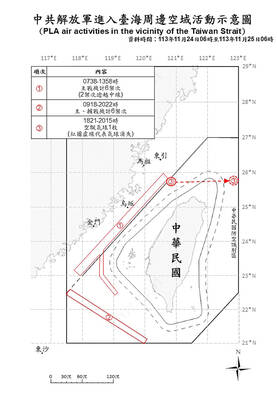Taiwan needs to update its election laws to ensure it has a functioning multiparty democracy by reducing the 5 percent threshold for political parties and other provisions, advocates said, after Saturday’s voting outcome wiped out all the small parties with no representation in the Legislature.
The “big two” parties of the Democratic Progressive Party (DPP) and Chinese Nationalist Party (KMT) have dominated the nation’s politics, but in the past, there were still smaller parties in the political landscape, pro-independence Taiwan Statebuilding Party Chairman Wang Hsin-huan (王興煥) yesterday said.
“But now the ‘third force’ composed of smaller parties has been obliterated since Ko Wen-je’s (柯文哲) rise and his launching of the Taiwan People’s Party (TPP), as the party has monopolized all the operating space and resources outside of the two main parties,” he said.

Photo by Sam Yeh, AFP
Wang castigated the election laws as benefiting the big parties, while creating harsh conditions for small parties, adding that it is detrimental to a healthy multiparty democracy.
Wang pointed to the difficulties and fighting just to survive the current situation by his own Taiwan Statebuilding Party.
Other parties which once had good representation in the legislature included the People First Party, which had 46 legislators in 2001, the Taiwan Solidarity Union (TSU), which had 13 legislators in 2001, and the New Power Party (NPP), which had five legislators in 2016, he said.
In condemning the current “game rules” as being unfair, Wang said that the laws contravened principles of “electorate equity” and an “equal vote of equal value,” and called for new measures in which the threshold must be lowered, for political party ballots to have one legislative seat, in which the present way of requiring 5 percent is excessively high.
“The current electorate system has become a game of ‘big money’ and ‘making connections’ for the big parties. It is a high barrier for small parties to breach... If the 5 percent threshold stays, then many citizens might have a crisis of confidence in our government. People have told us that they like our platforms, but they believe we cannot reach [the necessary] 5 percent, so instead of voting for our party, which they are led to believe as wasting their ballot, they instead voted for the big parties,” he said.
In a related development yesterday, NPP chairwoman Claire Wang (王婉諭) announced her resignation, along with all party executives to take responsibility for the party not winning any legislative seats despite garnering 353,670 votes or 2.57 percent of the vote on Saturday.
Additionally, TSU leader Liu Yi-te (劉一德) announced that he is quitting his position and has called for an executive meeting, suggesting that the TSU close down operations after it took in 43,372 votes or 0.31 percent, and no legislative representation.

Taiwan’s passport ranked 34th in the world, with access to 141 visa-free destinations, according to the latest update to the Henley Passport Index released today. The index put together by Henley & Partners ranks 199 passports globally based on the number of destinations holders can access without a visa out of 227, and is updated monthly. The 141 visa-free destinations for Taiwanese passport holders are a slight decrease from last year, when holders had access to 145 destinations. Botswana and Columbia are among the countries that have recently ended visa-free status for Taiwanese after “bowing to pressure from the Chinese government,” the Ministry

Theaters and institutions in Taiwan have received 28 threatening e-mails, including bomb threats, since a documentary critical of China began being screened across the nation last month, the National Security Bureau said yesterday. The actions are part of China’s attempts to undermine Taiwan’s sovereignty, it said. State Organs (國有器官) documents allegations that Chinese government officials engage in organ harvesting and other illegal activities. From last month to Friday last week, 28 incidents have been reported of theaters or institutions receiving threats, including bomb and shooting threats, if they did not stop showing the documentary, the bureau said. Although the threats were not carried out,

HEALTHCARE: Following a 2022 Constitutional Court ruling, Taiwanese traveling overseas for six months would no longer be able to suspend their insurance Measures allowing people to suspend National Health Insurance (NHI) services if they plan to leave the country for six months would be abolished starting Dec. 23, NHIA Director-General Shih Chung-liang (石崇良) said yesterday. The decision followed the Constitutional Court’s ruling in 2022 that the regulation was unconstitutional and that it would invalidate the regulation automatically unless the NHIA amended it to conform with the Constitution. The agency would amend the regulations to remove the articles and sections that allow the suspension of NHI services, and also introduce provisional clauses for those who suspended their NHI services before Dec. 23, Shih said. According to

‘GRAY ZONE’ TACTICS: China continues to build up its military capacity while regularly deploying jets and warships around Taiwan, with the latest balloon spotted on Sunday The US is drawing up contingency plans for military deployments in Japan and the Philippines in case of a Taiwan emergency, Japan’s Kyodo news agency reported. They would be incorporated in a first joint operation plan to be formulated in December, Kyodo reported late on Sunday, citing sources familiar with Japan-US relations. A US Marine Corps regiment that possesses High Mobility Artillery Rocket Systems — a light multiple rocket launcher — would be deployed along the Nansei Island chain stretching from Kyushu to Yonaguni near Taiwan, Kyodo said. According to US military guidelines for dispatching marines in small formations to several locations,